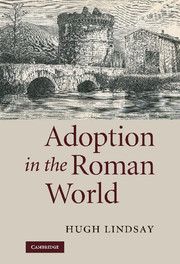Book contents
- Frontmatter
- Contents
- List of figures
- Preface
- List of abbreviations
- Introduction
- 1 Adoption, kinship and the family: cross-cultural perspectives
- 2 Kinship in Greece and Rome
- 3 Greek adoptions: comparisons and possible influences on the Roman world
- 4 Procedural aspects of Roman adoption
- 5 The testamentary adoption
- 6 Roman nomenclature after adoption
- 7 Adoption and inheritance
- 8 Roman freedmen and their families: the use of adoption
- 9 Adoption in Plautus and Terence
- 10 Sallust and the adoption of Jugurtha
- 11 Adrogatio and adoptio from Republic to Empire
- 12 Testamentary adoptions – a review of some known cases
- 13 Political adoptions in the Republic
- 14 Clodius and his adoption
- 15 The adoption of Octavian
- 16 Political adoption in the early Empire at Rome, Pompeii and Ostia; the imperial family
- Conclusion
- Glossary
- References
- Index
8 - Roman freedmen and their families: the use of adoption
Published online by Cambridge University Press: 25 January 2010
- Frontmatter
- Contents
- List of figures
- Preface
- List of abbreviations
- Introduction
- 1 Adoption, kinship and the family: cross-cultural perspectives
- 2 Kinship in Greece and Rome
- 3 Greek adoptions: comparisons and possible influences on the Roman world
- 4 Procedural aspects of Roman adoption
- 5 The testamentary adoption
- 6 Roman nomenclature after adoption
- 7 Adoption and inheritance
- 8 Roman freedmen and their families: the use of adoption
- 9 Adoption in Plautus and Terence
- 10 Sallust and the adoption of Jugurtha
- 11 Adrogatio and adoptio from Republic to Empire
- 12 Testamentary adoptions – a review of some known cases
- 13 Political adoptions in the Republic
- 14 Clodius and his adoption
- 15 The adoption of Octavian
- 16 Political adoption in the early Empire at Rome, Pompeii and Ostia; the imperial family
- Conclusion
- Glossary
- References
- Index
Summary
Freedmen and freedwomen after manumission still had many checks on their personal lives. These included obligations to their patron (if the patron was still alive) which extended beyond respect and personal service (obsequium and operae), only the latter legally enforceable, and included intrusions into their personal financial arrangements such as the patron's right to inherit the estate of the manumitted slave under certain conditions (Y. Thomas [1982] 527–80). The legal sources show that this was accepted as a reasonable and fair outcome by the freeborn community. The most important factor for a freed slave in a very hierarchical system was the low regard in which the status was held by the freeborn community. Whatever they did, they could not escape the fact that they were libertini, and this encompassed some restriction on the speed of social advancement. As increasing numbers of ex-slaves entered the community in the early Imperial period, the status was hardly rare. A process of integration was under way which encouraged a level of social mobility. This process of course cannot be quantified. Rapid social advance must have been difficult for all but the select few, usually members of the familia Caesaris, who still caused outrage and resentment amongst the elite. The hostility of our aristocratically biased literary sources to the freedman class is notoriously based primarily on the rising status of the imperial slaves, and their social recognition at a legal and financial level.
- Type
- Chapter
- Information
- Adoption in the Roman World , pp. 123 - 137Publisher: Cambridge University PressPrint publication year: 2009



